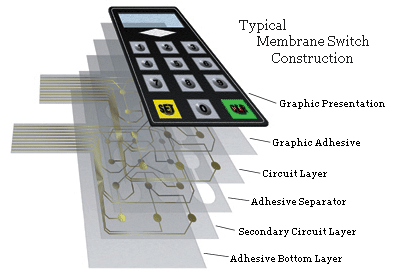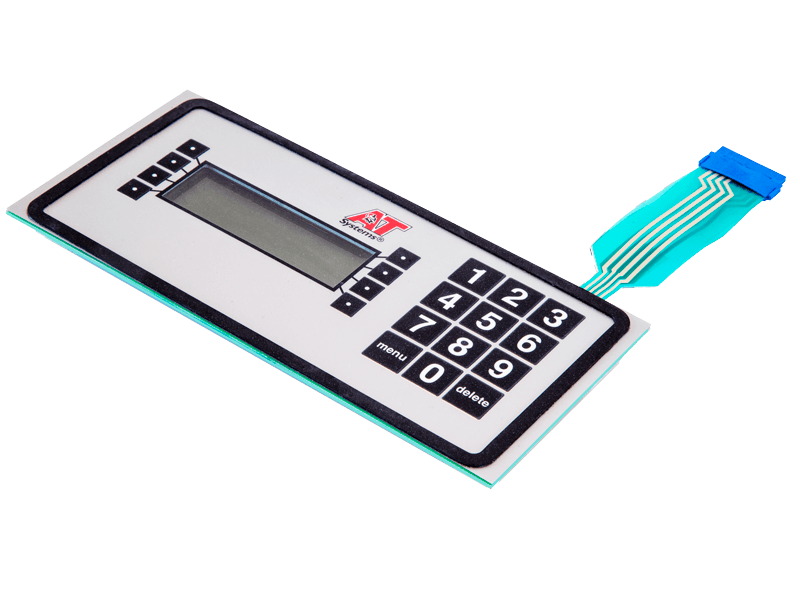Why Membrane Switches Are the Perfect Solution for Industrial Equipment
Why Membrane Switches Are the Perfect Solution for Industrial Equipment
Blog Article
Understanding the Importance of Membrane Switches in Interface
Membrane switches are essential parts in the design of effective individual interfaces, facilitating not only capability yet additionally improving visual appeal and individual interaction. Their unique attributes, such as resistance to adjustable styles and environmental factors, make them ideal for a diverse selection of applications throughout several markets. As we check out the various advantages and future fads related to Membrane innovation, it becomes clear that these switches are greater than just elements; they represent a merging of technology and functionality. The implications of this technology on user experience deserve checking out even more.
What Are Membrane Buttons?

The spacer layer, which consists of sticky residential properties, allows for the separation of the circuit layer from the overlay, ensuring that the switch stays in a non-activated state up until pressed. When stress is applied to the overlay, it presses the spacer layer, linking the space and finishing the circuit in the underlying layer. This design not only lowers the physical area required for conventional mechanical switches however additionally improves the toughness of the device, as Membrane buttons are normally immune to dirt, dampness, and various other ecological factors.
Commonly discovered in applications ranging from customer electronic devices to clinical gadgets, Membrane buttons are essential to modern innovation, offering a straightforward and efficient user interface that lines up with modern design demands.
Benefits of Membrane Buttons
While countless switch modern technologies exist, Membrane Switches offer distinct advantages that make them specifically preferable in various applications. One of the key benefits of Membrane buttons is their portable layout, which enables space-saving implementations in tools where real estate is limited. Their thin account not only enhances visual appeal yet also facilitates lightweight construction.
One more significant advantage is their resistance to environmental factors. Membrane buttons are usually secured against wetness, dirt, and contaminants, making them excellent for use popular atmospheres, such as medical tools and industrial devices. This longevity extends the life expectancy of the button, lowering maintenance expenses and improving integrity.
In addition, Membrane buttons can be tailored to meet specific design requirements, incorporating distinct graphics and colors that enhance user interaction. Their responsive comments choices can also be customized to provide a satisfying customer experience. Furthermore, Membrane switches are affordable, particularly in high-volume applications, as they can be produced successfully.
Applications in Different Industries

In the consumer electronics industry, Membrane buttons are prevalent in devices such as microwaves, washing machines, and push-button controls. Their tactile comments and visual choices improve individual experience while providing a sleek, contemporary appearance. In addition, automobile makers use Membrane switches in control panel controls and infotainment systems, where area is limited, and user involvement is crucial.
Furthermore, the commercial market leverages Membrane switches in control panels for machinery and devices, permitting intuitive procedure in typically rough atmospheres. Their resistance to chemicals and wetness guarantees durability and reliability in these applications. Generally, the adaptability of Membrane Switches adds significantly to their widespread use, making them vital in different technological domain names.
Design Factors To Consider for Membrane Switches

When designing Membrane buttons, numerous my company key considerations must be taken into consideration to make certain optimal capability and individual experience. The choice of products is critical; choosing resilient, high-grade substrates can enhance the switch's durability and resistance to ecological factors such as wetness and temperature level variations.
Secondly, the design of the visuals overlay should prioritize clarity and ease of usage. Icons and message must be understandable, and the design should promote instinctive interaction (membrane switches). Additionally, responsive responses is essential; incorporating a tactile dome or other mechanisms can boost the user experience by supplying physical confirmation of activation
Another important variable is the switch's electrical efficiency. Developers must make sure that the conductive traces are correctly developed to decrease resistance and prevent signal disturbance. This involves examining the called for actuation force and making certain compatibility with the digital components they will certainly interface with.

Future Patterns in Membrane Innovation
As innovation remains to advancement, Membrane switches are poised to advance considerably, driven by developments in products and producing strategies. One arising trend is the unification of sophisticated products, such as flexible substratums and conductive inks, which boost resilience and minimize the total weight of Membrane buttons. These products not just boost the tactile action however additionally enable for the layout of switches that can stand up to harsher environmental problems.
In addition, the combination of Click Here touch-sensitive modern technologies is transforming typical Membrane Switches into even more interactive interface. Capacitive touch sensors installed within Membrane button panels can offer a much more receptive and intuitive individual experience, straightening with the growing need for streamlined, modern-day layouts in customer electronic devices.
In addition, innovations in printing techniques, such as digital and 3D printing, enable fast prototyping and customization of Membrane buttons. This versatility enables suppliers to react faster to market demands and customer preferences.
Lastly, sustainability is becoming a significant emphasis, with producers exploring environmentally friendly products and processes. As these fads unfold, the future of Membrane modern technology promises enhanced functionality, aesthetic charm, and ecological duty, strengthening their function in innovative interface throughout numerous sectors.
Conclusion
Finally, Membrane Switches represent a vital part in the style of customer interfaces, incorporating performance with aesthetic versatility. Their benefits, including durability and resistance to environmental variables, make them suitable for varied applications throughout different sectors. Additionally, thoughtful design factors to consider boost customer interaction and experience. As advancements in technology continue, the evolution of Membrane buttons is anticipated to further improve interface, driving technology and enhancing use in a significantly intricate technical landscape.
Membrane buttons are indispensable elements in the design of efficient user interfaces, facilitating not just capability but additionally boosting aesthetic allure and individual communication.Membrane Switches offer as an important element in numerous customer interfaces, helping with a smooth interaction between users and electronic gadgets.While various switch innovations exist, Membrane Switches offer unique benefits that make them specifically preferable in numerous applications.Additionally, Membrane buttons can be personalized to satisfy particular layout needs, integrating special graphics from this source and shades that boost individual interaction.In final thought, Membrane Switches represent an important element in the design of user interfaces, incorporating capability with visual flexibility.
Report this page